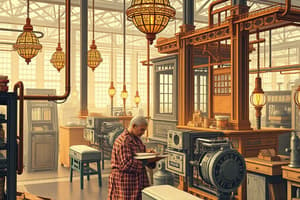Podcast
Questions and Answers
What are the three basic components of a manufacturing system?
What are the three basic components of a manufacturing system?
- Inputs, Processes, Outputs (correct)
- Resources, Machines, Products
- Inputs, Outputs, Processes
- Materials, Efficiency, Quality
A well-functioning manufacturing system can help create jobs and support economic growth.
A well-functioning manufacturing system can help create jobs and support economic growth.
True (A)
What is the primary function of a manufacturing system?
What is the primary function of a manufacturing system?
Production of goods and materials
Which of the following is a category for classifying arrival processes in queuing systems?
Which of the following is a category for classifying arrival processes in queuing systems?
What describes a single service facility in a queuing system?
What describes a single service facility in a queuing system?
In a queuing system, the speed of service can be expressed as __________ and __________.
In a queuing system, the speed of service can be expressed as __________ and __________.
What does queue discipline refer to in a queuing system?
What does queue discipline refer to in a queuing system?
Flashcards are hidden until you start studying
Study Notes
Manufacturing Systems
- Manufacturing systems produce standardized products in large volumes.
- Composition includes three basic components: inputs, processes, and outputs.
- Inputs refer to raw materials and parts used in manufacturing.
- Processes involve methods and techniques for transforming inputs into outputs.
- Outputs are the final products or services resulting from the manufacturing process.
- Manufacturing systems coordinate resources, machines, and workers for efficient production.
- A well-designed manufacturing system is crucial for ensuring product quality and meeting customer expectations.
- These systems enhance efficiency and productivity, lowering costs and increasing profits.
- Manufacturing contributes to job creation and supports economic growth.
Service Systems
- Service systems exhibit higher uncertainty regarding capacity and costs.
- Arrival Process:
- Customers can be classified based on source (infinite or finite).
- Arrivals may be individual or in groups (single arrivals or batch arrivals).
- Customers may arrive deterministically (at regular times) or stochastically (random intervals).
General Structure of Queuing Systems
- Service System:
- Consists of structure and speed aspects.
- Structure can vary from single server models (one service facility) to multiple parallel facilities.
- Single server models feature one service point, like a library counter.
- Multiple, parallel facilities with a single queue, where each server handles the same service (e.g., mechanics at a service station).
- Multiple, parallel facilities with multiple queues, where different servers have separate queues (e.g., electricity bill counters).
- Service facilities in a series can involve multiple service steps at different stations (e.g., machining processes).
- Speed of Service:
- Expressed in terms of service rate (number of customers serviced over time) and service time (duration needed for servicing).
- Service rate and service time are reciprocals indicating a facility's capacity.
Queue Structure
- Queue structure involves the discipline governing the order of service for waiting customers.
- First-come-first-served is one example of a common queue discipline.
Studying That Suits You
Use AI to generate personalized quizzes and flashcards to suit your learning preferences.




